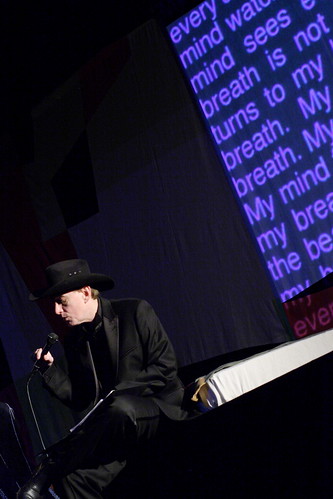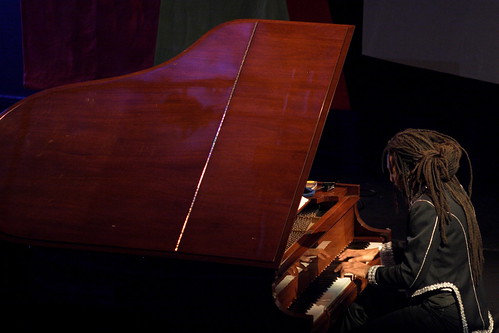 Date: December 15, 2011
Date: December 15, 2011
Venue: Brooklyn’s Irondale Center
Photos by Phillip Stearns
Review by Augusta Palmer
Alex Waterman’s production of Vidas Perfectas is a new Spanish translation of Robert Ashley’s 1979 opera, Perfect Lives. It’s a Buddhist soap opera, a series of visual and vocal images simultaneously held together and pulled apart by illusion.
In addition to the eloquence of the libretto, a recent performance at the Irondale Center in Fort Greene brought together an amazing cast of characters. Ned Sublette’s Raoul de Noget was an incredible creature, a lounge lizard dressed in black, never obscured by the brim of his Stetson but casting a large shadow with his physical presence and his voice. Elio Villafranca coaxed beautiful sounds out of the piano at center stage, embodying more than merely playing the role of Buddy, The World’s Greatest Piano Player. Ably supported by Elisa Santiago and Abraham Gomez-Delgado as a chorus of other roles, de Noget and Buddy propel us through a series of worlds.
Alex Waterman is to be congratulated on the spare elegance of the staging as well as the beautiful and thought-provoking use of Spanish. Coupled with Peter Gordon’s sound design, set design by artist Sarah Crowner, text projections in English, and the anchoring force of the omnipresent neon emblem of the work – a symbol that is at once trident, pitchfork, vanishing point, and an intersection of roads representing an intersection of worlds – the performers enacted their roles in flesh and blood as an eager audience filled the Irondale. Yet at the same time, there was a distinct other worldliness to the experience of witnessing the performance. This is not entirely surprising, given that it’s an opera about liminality, set in a motel room, the moment before marriage, the doorway into a backyard.
The range of references Vidas Perfectas evoked was doubtless unique for every participant, but for me, the holy roller sounds of organ vamping blues, the poetic libretto with its fractured poetry and campy melodrama, and the simple visual elegance of the production at various moments called to mind the sturm and drang of Dallas and Dynasty, the Carnival of Souls, and Chris Marker’s La Jetee. Vidas Perfectas juxtaposes characters as all-American as the captain of the football team and the homecoming queen with a shout out to Giordano Bruno, the monk, mystic and mnemonist who held firmly to his belief in multiple worlds even as he faced death at the hands of the Catholic Church. But, above all what struck me was that the collision of these elements resulted in something far more affecting than the sum of its parts.
Without Perfect Lives, it’s been remarked that there would be no Laurie Andersen or Spalding Gray, the spoken word artists inspired by Robert Ashley who took us swimming to Cambodia and beyond, but it’s the piece itself, rather than its history, that tantalized me so much in December that I’m still thinking about the performance a month later. Even in this fragmented form – only Part I, The Park; Part VI, The Church; and Part VII, The Backyard were presented in this installment of Vidas Perfectas – it’s an astounding piece of work. I can’t wait to hear more. I’m also looking forward to Ashley’s newest opera CONCRETE: The Next Generation, which will be presented at Roulette in April. And I’m just as excited to read the libretto of Perfect Lives and to see the televisual version of the translated Vidas Perfectas. How will it evoke the images that are so indelible in my memories of the Irondale performance?
How will it render the moment, near the end of the opera, when Elisa Santiago (as Isolde) sang, poised in the doorway between the house and the backyard:
“Dear George…
What’s going on? I’m not the same person that I used to be.”
There’s something particularly ghostly and evocative about this moment. Isolde is suspended on the threshold between death and life, standing in the doorway deciding whether to fade away or commit to inhabiting her body fully.



